
HOME / Departments / Physics / Complex Fluids
Complex Fluids
- Lab. of complex fluids studies non-equilibrium and nonlinear dynamics involved in biological systems from experiment and theoretical approaches. The goal of our laboratory is to bring novel understandings of physics of collective systems far from equilibrium. To answer " what if life?" from physical view points, primary efforts are focused in projects listed below:
- Fluid dynamics and transport phenomenon out of equilibrium
- Collective behaviors of active matters
- Biophysics of artificial cell assembly
Physics of non-equilibrium dynamics
Temperature differences at large scales, kilometers or more, are present in our planet and essential for plate tectonics and meteorological phenomena. As the earth is blessed with temperature, it has revolutionized our life: Carnot showed the operation of the heat engine in two temperature systems at the industrial revolution, which led to second law of thermodynamics.
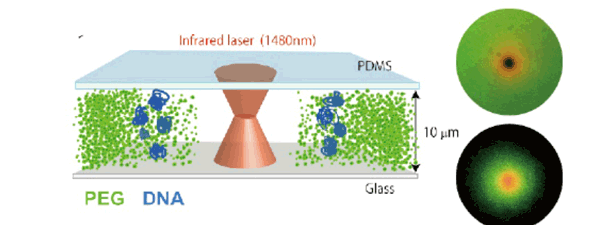
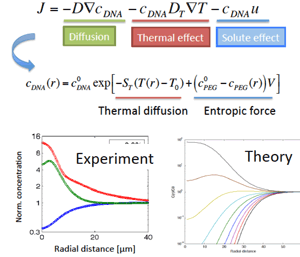
On a smaller scale, millimeters or less, temperature differences are also present in the pores of hydrothermal vents. The motion of molecules under such temperature gradients, called thermophoresis, where thermal convection is suppressed could be relevant to the inhomogeneous distribution of chemical species. To understand thermophoresis at a small scale, we study molecular transport in a temperature gradient built by infrared laser focusing. Our papers [Refs.1-3] report that temperature gradients in a polymer solution can select and accumulate DNA and RNA. A consequence of this effect concerns the origin of life: temperature gradients present at the hydrothermal vent at deep sea ocean may select small RNA enzymes from a pool of random sequences.
Biophysics of artificial cell assembly
Living cells produce themselves. A major conceptual question in biology is self-reproduction. One may understand it for self-replication of biopolymers following von Neumann logic, which implies a memory. But, how does self-reproduction operate without apparent memory? To address this question, we will devise synthetic biochemical replicators using two bottom-up approaches, synthetic biology and organic chemistry.
For self-reproduction, the division of cells is one of inevitable steps. In living cells, cytoskeleton contributes to not only the mechanical stiffness but also organized partitioning of proteins in order to achieve cell division. One of the major never-achieved goals of cell replication is self-organization in cell-sized compartments programmed with genetic program. We tackle the synthesis of organized partitioning of proteins by using bottom-up reconstruction [Refs. 4-6].
References
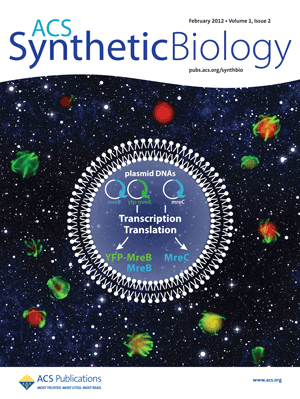
[1] Y.T. Maeda, A. Buguin, A. Libchaber. Physical Review Letters 107, 038301 (2011)
[2] Y.T. Maeda, T. Tlusty, A. Libchaber. Proc. Natl. Acad. Sci. USA 109, 17972-17977 (2012)
[3] T. Fukuyama, A. Fuke, M. Mochizuki, K. Kamei, Y.T. Maeda. Langmuir 31, 12567-12572 (2015)
[4] V. Noireaux, Y.T. Maeda, A. Libchaber. Proc. Natl. Acad. Sci. USA 108, 3473-3480 (2011)
[5] Y.T. Maeda, et al. ACS Synthetic Biology 1, 53-59 (2012).
[6] Y. Shimamoto, Y.T. Maeda, Shinichi Ishiwata, A.J. Libchaber, T.M. Kapoor. Cell 145, 1062-1074 (2011)
Opportunity for international collaboration with US and Europe
Maeda group proceeds with an international collaboration project supported by Human Frontier Science Program (HFSP) organization, which is one of most prestigious grant in natural science. Collaborative network is among our group in Japan, two groups in United states, and one group in Germany. We thus offer the opportunity to develop your skill for international collaboration at the broad areas from physics to chemistry and biology. This experience at early stage of graduate study may open your mind to become an leading scientist who can break the barrier between physics and biology.
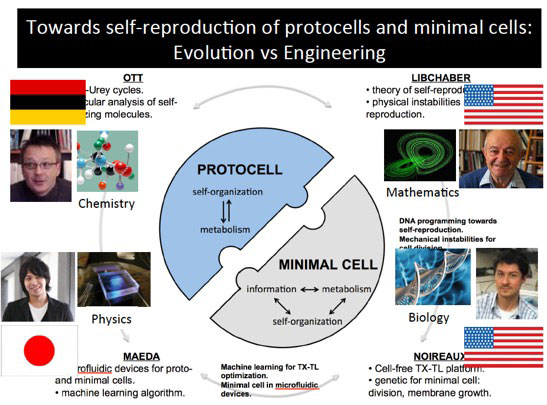
For further information, please visit our website.
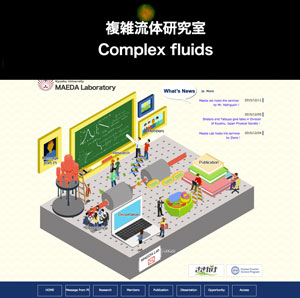
http://nln.phys.kyushu-u.ac.jp/en/
Note: Tokita group will not accept graduate students due to compulsory retirement of Prof. Tokita at FY 2017. Who may have interests in our study should contact at Assoc. Prof. Maeda.
ymaeda@phys.kyushu-u.ac.jp.